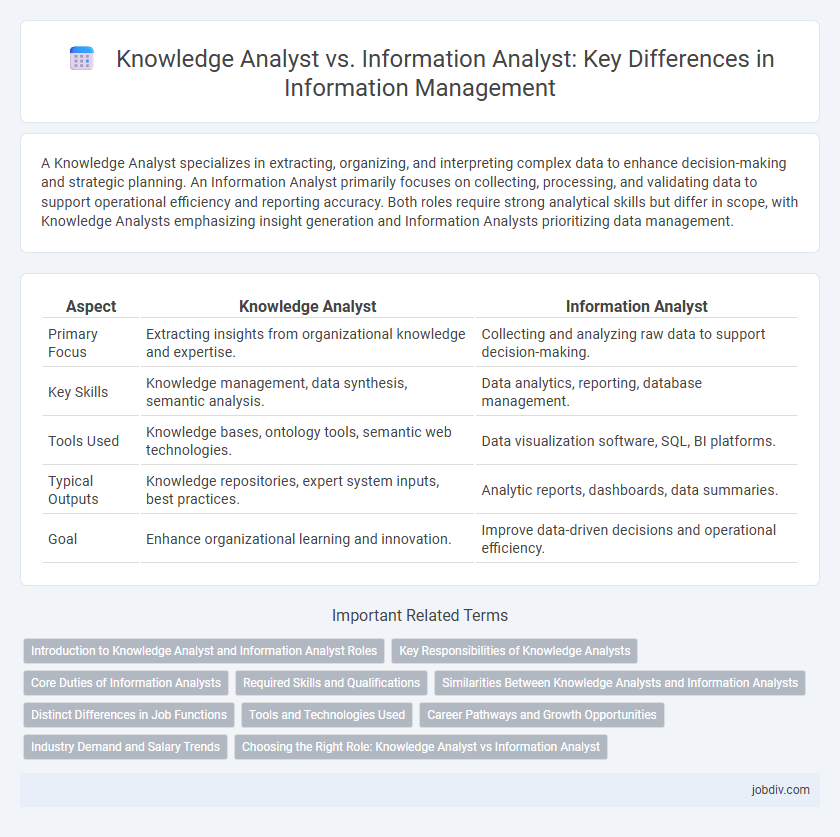A Knowledge Analyst specializes in extracting, organizing, and interpreting complex data to enhance decision-making and strategic planning. An Information Analyst primarily focuses on collecting, processing, and validating data to support operational efficiency and reporting accuracy. Both roles require strong analytical skills but differ in scope, with Knowledge Analysts emphasizing insight generation and Information Analysts prioritizing data management.
Table of Comparison
| Aspect | Knowledge Analyst | Information Analyst |
|---|---|---|
| Primary Focus | Extracting insights from organizational knowledge and expertise. | Collecting and analyzing raw data to support decision-making. |
| Key Skills | Knowledge management, data synthesis, semantic analysis. | Data analytics, reporting, database management. |
| Tools Used | Knowledge bases, ontology tools, semantic web technologies. | Data visualization software, SQL, BI platforms. |
| Typical Outputs | Knowledge repositories, expert system inputs, best practices. | Analytic reports, dashboards, data summaries. |
| Goal | Enhance organizational learning and innovation. | Improve data-driven decisions and operational efficiency. |
Introduction to Knowledge Analyst and Information Analyst Roles
Knowledge Analysts specialize in transforming raw data into actionable insights by leveraging expertise in data modeling, information retrieval, and semantic analysis. Information Analysts focus on collecting, organizing, and evaluating data to support decision-making, often emphasizing data quality, reporting, and information systems management. Both roles require strong analytical skills, but Knowledge Analysts prioritize creating knowledge frameworks, whereas Information Analysts center on data accuracy and accessibility.
Key Responsibilities of Knowledge Analysts
Knowledge Analysts focus on collecting, organizing, and analyzing vast datasets to extract actionable insights that improve decision-making processes. They specialize in developing knowledge management systems, ensuring information accuracy, and facilitating knowledge sharing across departments. Their key responsibilities include data interpretation, creating knowledge repositories, and supporting strategic initiatives through evidence-based analysis.
Core Duties of Information Analysts
Information Analysts specialize in collecting, processing, and interpreting vast datasets to support decision-making and improve organizational efficiency. Their core duties involve data validation, creating detailed reports, and identifying trends or anomalies within information systems to guide strategic planning. Mastery in data visualization tools and strong analytical skills are essential for transforming raw data into actionable insights.
Required Skills and Qualifications
Knowledge Analysts require expertise in data management, information retrieval, and analytical reasoning, often holding degrees in library science, information technology, or data analytics. Information Analysts prioritize skills in statistical analysis, data visualization, and business intelligence tools, commonly possessing backgrounds in computer science, statistics, or business analytics. Both roles demand strong communication abilities, proficiency in database technologies, and experience with data modeling to support organizational decision-making.
Similarities Between Knowledge Analysts and Information Analysts
Knowledge Analysts and Information Analysts both specialize in collecting, processing, and interpreting data to support decision-making within organizations. They utilize advanced analytical tools and methodologies to transform raw data into actionable insights, emphasizing data accuracy and relevance. Both roles require strong skills in data management, critical thinking, and effective communication to bridge the gap between complex information and strategic business objectives.
Distinct Differences in Job Functions
Knowledge Analysts focus on managing and interpreting organizational knowledge assets, ensuring effective knowledge sharing and utilization. Information Analysts specialize in collecting, analyzing, and presenting data to support business decision-making processes. The distinct difference lies in Knowledge Analysts emphasizing knowledge management strategies, while Information Analysts concentrate on data analysis and reporting.
Tools and Technologies Used
Knowledge Analysts utilize tools such as knowledge management systems, semantic analysis software, and natural language processing technologies to extract insights from unstructured data and improve decision-making processes. Information Analysts rely heavily on data visualization tools, SQL databases, business intelligence platforms like Tableau and Power BI, and statistical software such as R or Python to analyze structured datasets and generate actionable reports. Both roles leverage advanced analytics, but Knowledge Analysts focus on contextual understanding while Information Analysts prioritize data accuracy and trend identification.
Career Pathways and Growth Opportunities
Knowledge Analysts specialize in organizing and interpreting complex data to enhance organizational decision-making, often advancing into roles such as Knowledge Manager or Data Scientist with a focus on strategic knowledge assets. Information Analysts concentrate on analyzing information flow, system efficiency, and data integrity, leading to career growth in IT management, business analysis, or data governance. Both career pathways offer opportunities in data analytics, with Knowledge Analysts leaning towards knowledge management and Information Analysts towards information systems optimization.
Industry Demand and Salary Trends
Knowledge Analysts and Information Analysts both play critical roles in data-driven industries, with Knowledge Analysts specializing in extracting actionable insights from organizational knowledge bases, while Information Analysts focus on managing and interpreting large datasets. Industry demand for Knowledge Analysts is rising in sectors like consulting and technology, where expertise in knowledge management tools enhances decision-making, whereas Information Analysts see robust growth in finance, healthcare, and marketing due to their skills in data mining and predictive analytics. Salary trends indicate Information Analysts generally command higher average earnings, with median salaries ranging from $70,000 to $95,000 annually, compared to Knowledge Analysts who typically earn between $60,000 and $85,000, reflecting the specialized technical skills required in each role.
Choosing the Right Role: Knowledge Analyst vs Information Analyst
Choosing between a Knowledge Analyst and an Information Analyst depends on your focus area: Knowledge Analysts specialize in transforming organizational data into actionable insights by leveraging knowledge management systems, while Information Analysts concentrate on collecting, processing, and analyzing raw data to support decision-making. Expertise in data modeling, analytics tools, and knowledge databases distinguishes these roles, with Knowledge Analysts often emphasizing strategic knowledge dissemination and Information Analysts focusing on data accuracy and reporting. Understanding these core functions helps align career goals with the appropriate role in data-driven environments.
Knowledge Analyst vs Information Analyst Infographic

 jobdiv.com
jobdiv.com